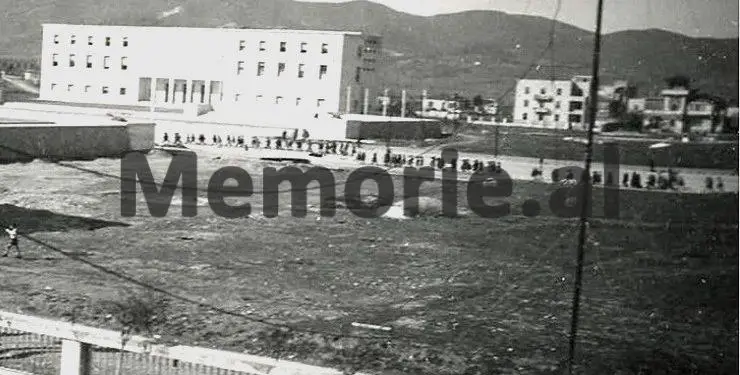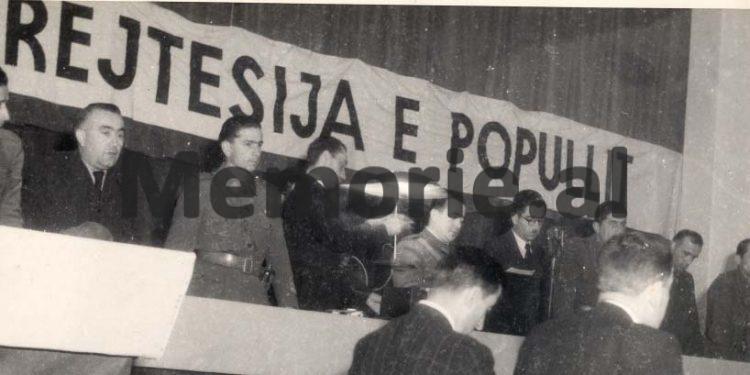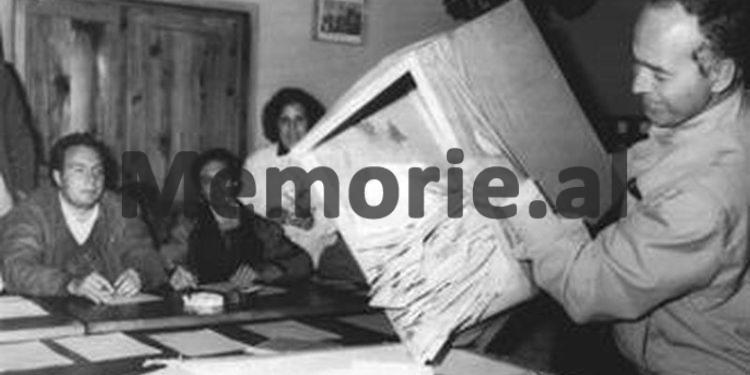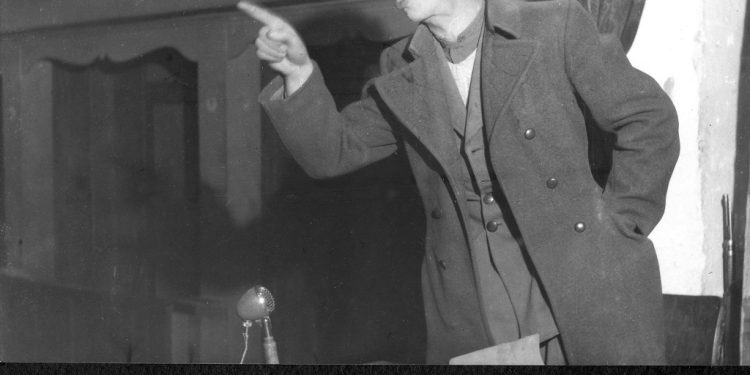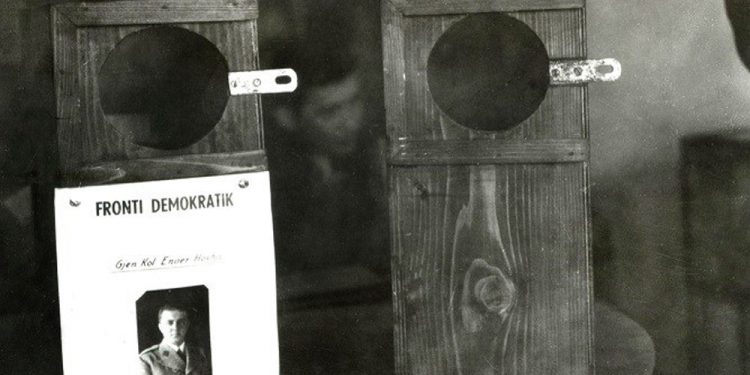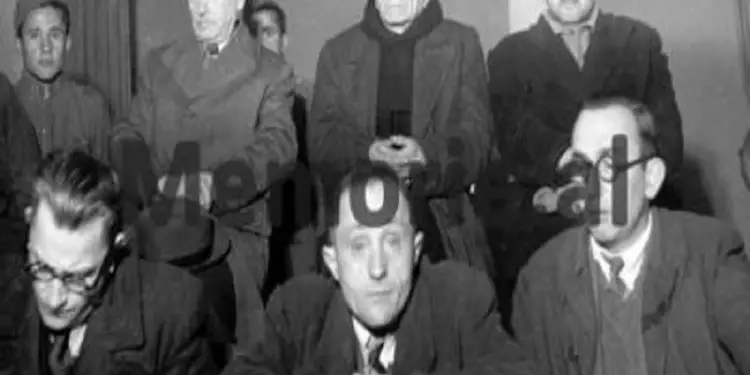By Franco Benanti
Part four
Memorie.al / The Second World War had a powerful impact on Albanian lands as well. Much has been said about this by our historians, in the communist spirit. The generations before 1990, have learned this from textbooks, from the History of the Labor Party and the History of Albania, but very few eyes have been familiar with the alternative treatment made by historians and non-communist authors, inside and outside the country. In this regard, the book “La guerra piu lunga” by Franco Benanti, a former doctor in the Italian occupying army, in the Balkans and Albania, published by the house “Mursia” in Milan, is of great interest (first edition in 1966, followed by four reprints later).
Continues from the previous issue
The communist uprising in Shkodër
On November 12, 1945, I was ordered to move to Gjirokastra. On the same day, the police seized all the means of transport and an unusual movement was noticed. The commissioner gathered us and informed us that; “in Shkodër, reactionaries and bandits, enemies of the people, have taken up arms against the government, but their revolt was liquidated within a few hours”.
He continued that; “The liquidation of all the reactionaries is our most important problem today.” As we found out later, the people in Shkodër could no longer bear the suppression of the communists and preferred a terrible end to an endless horror. In Gjirokastra I met my friends, the Basilian priests. The director of the hospital, a certain Dr. Vasili, half doctor and half politician, had a hatred for Italians. He denounced two Italian doctors, Varano and Viti, who were arrested and imprisoned in the city’s castle.
In the regiment, I met the commander, Ferik Hado, and the Yugoslav instructors, who had come to train the military cadres here. The Yugoslav government had brought supplies of weapons, ammunition, clothing and other necessary materials.
Farce of elections
The local press, heavily on the side of the communists, made propaganda about the upcoming elections every day. They were considered very important. But only the Soviets and their satellites recognized Enver Hoxha’s government. In April, the Yugoslavs sent Ambassador Velimir Stojnič, the former head of the Yugoslav military mission. Only at the end of 1945, the four great powers recognized the Albanian government, but with a reservation: diplomatic relations would be established after the situation in this country was clarified.
The election was held on December 2, 1945, and was a true farce. Only the Communist Party participated. 542,000 voters took part. For every 10,000 eyes, one deputy would be elected. Almost everyone voted for the communist candidates. There were even cases when they voted for 110%! Why so? Because only the blank, blank tabs were called invalid, while those that were filled in “wrongly” went in favor of the candidate. This is what happened in a center in Gjirokastra, where ten wrongly filled tabs came out. As a result, 99.99% of the voters were in favor of the communist candidates. This could not but bring disappointment to the Western allies, who did not invite Albania to the Conference on German War Reparations. Yugoslavians and Czechoslovakians shared something for Albania.
After the elections, two Italian doctors, Varano and Viti, who had been arrested before, were released. They told me what had happened to them. One day in April, two officers of the political police (State Security) went to the hospital and asked for the two doctors. When these had appeared, the officers had behaved humanely, but had invited them to the castle, where the offices of the secret police were. There they were searched and everything was taken from them (money, watches, etc.).
Then they were locked in a cell, two weeks before they were questioned. The investigator had asked them separately: first name, last name, paternity, etc. The previous life in detail, the people they knew. etc. They were called to the investigator many times, day and night, being accused of subversive activity and espionage. They were accused of collaborating with the collaborators. etc. Everything was apparently done to create a spirit of panic and terror everywhere. Christmas was approaching. I went and met the priests on the night of December 24. There I found a certain Nesti Papajorgji, a young Greek minority.
After Christmas, I felt a shadow of doubt creeping around me in the regiment. However, the head of finance called me to the office and handed me 250,000 ALL, the salary of two years of work. This amount was added to some gold napoleons and money won in Korça and Delvina. I was thinking of sending them to my family in Italy. I therefore wrote to Consul Turcato. But he did not have time to answer me because, on January 21, he was expelled from Albania. At that time they also arrested Nesti Papajorgji, who was locked in the castle.
The commissioner called me into the office and asked me what I had done on Christmas Eve. “How is it possible for a doctor like you to be deceived by some devils, such as priests” – he observed. After that, many employees and other acquaintances of mine turned their backs on me or stayed cold.
Expulsion of the Italian clergy
After Mr. De Gasperi became prime minister in Italy, the Albanian government ordered the expulsion of all Italian clergy. These clerics have been operating in Albania for many years. Christianity itself has entered here since its beginnings. Paleo-Christian assemblies and churches can be found everywhere in the country. Albanian Christians opposed all foreign invaders, including the last ones, the Ottomans.
At their head in the 15th century, was the famous Skenderbe, who when he was dying, ordered his relatives to go to Italy. But most of those who did not leave their homeland converted to Islam. Only in 1815, when Austria took possession of the Lombardy-Venetian region, the first group of Catholic missionaries, belonging to the Veneto-Lombard Society of Jesus, came to Albania. After the Jesuits, other orders came to Albania, such as; the Franciscans, the Fathers of Don Orione, the Lazarists and the Vincentians, the Basilians, the Catholics of the Oriental Rite. Prominent local clergy were Father Anton Arapi, Father Gjergj Fishta, Father Bernardin Palaj, Vincens Prenushi, Pjetër Gjura, etc.
At that time, Catholics in Albania numbered 124,000 people, representing 11.27% of the entire population. The Catholic Church had two Archdioceses of Durrës and Shkodra, three Dioceses of Pulti, Sapa and Lezha, the Apostolic Administration for South Albania, 131 churches. In total there were 93 secular priests, 94 belonging to religious orders and 230 sisters from different congregations.
The first three months after liberation, there was a silent peace between the government and the clergy. The government pretended to be the protector of the poor, as did the clergy. She wanted to gain some support from Claire as well, as long as she still felt weak. But ideologically, religion was an opponent of the communists, who considered it as an integral part of the capitalist order. Even the communists encountered a greater resistance to religion than they expected. That’s why they considered him enemy number one. He started an unprecedented campaign against the Catholic Clergy, which was called as; “tool of the Vatican and American imperialism”.
The regime invented thousands of reasons, facts, just to compromise and fight the Catholic Clergy in particular. In April 1945, four priests were arrested and sentenced to death, accused of “counter-revolutionary activities”. Many others suffered physical violence. On May 24, the communists set fire to the Apostolic See. Children’s asylums, run by the sisters, were closed and religious schools, or their teachers, were replaced by state teachers, while the programs were changed, in the Marxist-Leninist spirit.
The communist offensive continued with the death sentence of 11 priests of the Shkodra Seminary, who were said to be held with “foreign money”. They were shot, on March 4, 1946. Their corpses stayed all day by a stream, on the outskirts of Shkodra. The other members of the Seminar were sentenced to 15-30 years.
On January 18, 1946, 82 Italian priests were expelled from Albania. The police took everything they had, put them in trucks and accompanied them with guards to Durrës, to the building of the Archdiocese, from where they had arrested Vincenso Prenushin. The police treated the clergy as if they were ordinary criminals. The Italian priests had to wait there for 36 days before leaving for Italy.
Vincensio Prenushi, was sentenced to 30 years in prison, died in August 1952. Other victims were Frano Gjini, Gjergj Volaj and Krustofor Kisi. They tell about Gjergj Volaj, that when his mother went to see him before he was shot, she begged him to “cry, not for his son and his sufferings, but for the sufferings of the church”!
The communist press wrote after the priests were shot that “they had confessed with their mouths the crimes committed as spies of the Vatican and imperialism”. The ferocity of the Albanian communists surpassed even those suffered by the first Christian martyrs. The archpriest of the Cathedral of Tirana, Dom Shtjefën Kurti, and that of Durrës, Jozef Bonati, was shot without any trial.
An orthodox priest, Papa Pando, from Fieri was shot as a spy and traitor, because he had converted to Catholicism, in 1943. Pope Petro Isaku, of the Catholic mission of Korça, who was appointed a priest in the Greek College of Rome, was sentenced to life imprisonment. Agostin Spanu, Benardin Shllaku, Laka, Gurakuqi, Papa Josifi suffered punishments and persecution.
Pope Pandelejmon of the Catholic mission in Pogradec was massacred in an ambush. They called him from Fieri with a fake telegram and shot him while he was traveling. Then they dismembered his body, put it in a sack and sent it to the Mission. The biggest piece was the head. The communists put a ticket in his mouth, which read “Why do you become a partisan of the Pope”?
Many other Albanian priests have paid with their heads for their loyalty to the Church. In 1948, the communists issued a decree for the creation of the Albanian Schismatic Church, in order to separate it from the influence of the Vatican and put it at the service of the regime. Shllaku and some other priests were released on the condition that they accept the draft of the new Church statute. Since then, the persecution of the church stopped.
The intensification of terror against Italians
On January 14, 1946, the Albanian government expelled the consular mission and its head, Turcat. Even when the mission personnel were waiting for the plane at the airport, they were surrounded by armed soldiers; the suitcases were searched, from where they took everything valuable, such as 280,000 lira, which had been in the mission’s treasury, 24 gold sterling, ordered for an Italian family, from an Italian citizen in Albania.
On January 27, 1946, an order of the Minister of Public Works made it possible to confiscate all the assets of the Italians against an invoice, which did not bear any official signature or stamp. After the departure of Turcati, about a thousand other Italians were able to repatriate, but many doctors still remained here, “for the needs of the country”.
In 1946, the 5th plenum of the Central Committee of the Albanian Communist Party was held. There, the organizational secretary, Koçi Xoxe, expelled Sejfulla Malëshova from the Political Bureau, under the charge of reactionary politics in the foreign field, especially the economic one. This demanded that relations with the West be improved, for tolerance towards the Catholic Clergy, for the private economy, leaving the field of shares free, for business lending, etc.
At that time Prof. was arrested. Venanzio Lozzi, the first surgeon of the Tirana hospital, medical officers, Semproni and Armeni, ing. Ludovik Patrassi, director of the oil site in Kučovo, Dr. Antonio di Marchis, assistant of Prof. Lozzit, Dr. Rummo, civil doctor, ing. Gallo, Eng. Agostione and the industrialist Masserini. The common charge was; “action against the regime” and “sabotage”, etc.
Prof. Lozzi, who had gained a good name among the people of the capital and beyond, was accused of gold smuggling. In fact, he had been seen visiting the American legate and the archdiocese of Durrës (that’s why they called him a “spy”). They let him go to visit his family in Italy, provided he didn’t stay there long.
As soon as he returned here, he was arrested on the charge that “he had taken valuables and valuables to Italy, with the help of his wife”. According to the prosecutor, he had inserted valuable items, such as gold, jewelry, etc., into the stomachs of the Italians who were operated on. But in the absence of evidence, he was nevertheless sentenced by firing squad. Many Italians were languishing in prisons, in appallingly bad conditions.
Me too, host of the political prison
On the morning of April 10, 1946, the commissar called me. Without looking at me, he handed me a transfer order and a travel slip. Destination: Tirana Military Hospital. He told me I had to leave immediately. He gave me no other explanation. After a journey with a mail car, along more than 150 km., I arrived in the evening in the capital. At the entrance to the city, we were stopped at a checkpoint, where our identity cards were checked.
Back then, you couldn’t stay anywhere for 24 hours without reporting to the police. We followed the road to the “Continental” hotel. I had not yet brought down my suitcase, when two soldiers approached me, a captain and a sergeant of the military police. I still remember that moment.
– “Doctor, please come to the command to complete some formalities. I accompany you. The car is waiting for us outside”.
– “Why should I come to the command, when I can clarify from here” – I observed.
– “No, it is not possible; we have been waiting for you for half an hour for this. Please get dressed and accompany us!” – added the captain bluntly.
We left the hotel and got into an American “Jeep”, which was parked in front of the hotel. After 10 minutes, we stopped in front of a one-story building with iron-barred windows. The car drove into her yard. Through a corridor, we came to a large room, where the director of Tirana’s Security was sitting next to a table.
They left me alone with him, standing like that. After looking at me from head to toe, he said:
– “Do you have a weapon with you”?
Meanwhile, a policeman searched my body and found nothing, except for 250,000 lek and some gold coins (gold francs) that had been given to me as back wages in Gjirokastër some time ago. Remembering that he made a great discovery, the director asked me:
– “Where did you get this money from?” Didn’t the priests give you for your work as a spy”?
– “It’s not true, – I answered. – I earned them with my work. You can ask the command of Gjirokastra about this”.
– “We know where to get the information – he interrupted me. – But that’s not all, there are more important things that you should explain to us”. Then he gave some orders to a sergeant, who took me to a cellar, where he took my watch, some personal belongings, my trouser belt, and locked me behind a gate with a large padlock, pushing me and saying: “Come in.” inside, fascist criminal”!
From that moment on, I ceased to be a human being for them. The cell looked like hell to me: four granite walls, cement floor, barred windows nothing else. Through the window and the door, the cold came in. The air was full of moisture. My brain started working fast. Why was I in this prison?! What evidence was against me? I don’t know how long it was like that, until I fell asleep.
The next day another officer entered the cell and asked me the same questions as the day before. Later I realized that the secret political police in Albania, (State Security), had created a multiple and concentric surveillance, according to which, every guard was himself guarded by someone else, and every controller was controlled by others, no one was trusted , mistrust was mutual, mistakes impossible and the regime unbreakable.
After a while, a burly young policeman brought me some cornbread and a fat-free pea soup with barely a grain in it. Food came twice a day. They brought cigarettes once every three days. All night long I could hear the animal screams, coming from the other side of the corridor, because of the tortures that were carried out there and which filled me with fear.
I slowly started to recover. I was pacing the room, punching the walls, just to feel the blood flow in my body. The steps of the prisoners, the jingling of the keys, the voices of the guards, were what I felt day by day. Finally, I was subjected to regular interrogation.
– “Name, surname, paternity, etc. Tell us about your life, from childhood to today. First of all, we want you to be honest, concrete, and accurate about yourself”. They wanted to know everything: what my father had done, where my family lived, how the economic conditions were, why I chose the profession of a doctor, where I had studied, etc., etc. They wanted to know the motive behind my every action. It went on like this for more than three hours.
– “Enough, escort him to the cell”! – ordered the investigator.
– “Excuse me for a moment, Mr. Captain – I intervened – I want to know what I am accused of”?!
– “For now, I can’t tell you anything. You can go.”
The captain left the room without hearing me. They called me again at two in the morning. The same questions are repeated. I spoke humanely, slowly. They asked me if I was crazy about the war, about the Prime Minister, De Gasperi.
– “I hate war,” I told him, “I don’t know De Gasper.”
The investigator was taking notes.
– “Mr. Captain – I persisted again – why am I here? I have been trying to figure it out for ten days. I’m losing my mind”?!
– “Are you out of your mind?! Your brain is running away from the priests and reactionaries. You can call yourself dead; you will never see them again”. He was talking with his hands and signs, excited. I understood the accusation: connection with the priests and the reaction. That would mean the death penalty! Investigations continued. The next day, before I had breakfast, I was called to the investigator.
– “We have reliable information that you are a spy for the priests. In order not to aggravate the situation you are in, you must speak correctly and openly. Tell us the names of Albanians and foreigners who are connected to the reaction. I’m listening to you.”
– “I have not been anyone’s spy. So I don’t have to tell any names”.
– “Like that?! You don’t know anything. You don’t know anyone”?
The investigations were repeated more and more often. They took me at 17:00 and kept me interrogated for over three hours. They took me even at two in the morning, no less than two hours. I did my best to resist. I understood that the investigators did not want to find the truth, but wanted to gather material to definitely incriminate me. They had found a photograph that I kept in my suitcase, where I had gone out together with Father Raffaele Muccno, whom I had known in Korça.
As well as some tweeds with stars, and the rank I wore when I joined the partisans. I could hardly convince the investigator that it was not about the fascist emblem. They asked me to declare why I had joined the Italian army, which had committed crimes against the Albanian people. I was being asked to testify about the crimes my division had committed. Memorie.al
The next issue follows




